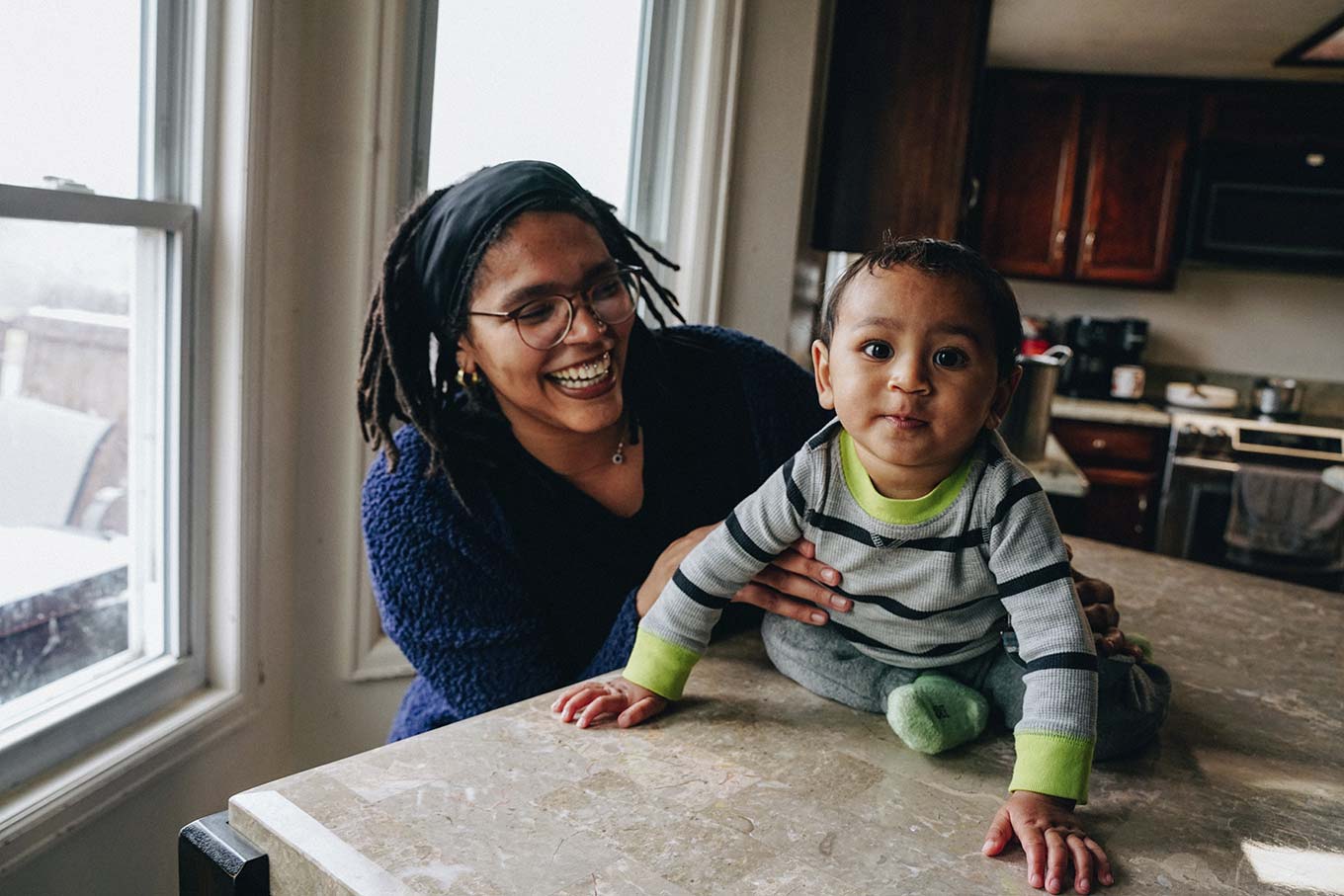
Halle Payne, 22, plays with her youngest son, 1-year-old Ezra, on April 3, 2025, at their home in Morrison, Colo. Photo by Armando Geneyro / Special to The Colorado Trust
Halle Payne, 22, plays with her youngest son, 1-year-old Ezra, on April 3, 2025, at their home in Morrison, Colo. Photo by Armando Geneyro / Special to The Colorado Trust
When Halle Payne became pregnant with her second child, she didn’t have much trust in the health care system.
During her first pregnancy, when she was just 19 years old, doctors found what they believed to be a fibroid on her ovary. She was in her second trimester, and her providers recommended monitoring it during subsequent check-ups.
Before her next appointment arrived, Payne got sick. “I thought that I was dying,” Payne, now 22, recalled. “It was the worst pain ever in my lower abdomen area.”
She was rushed to the emergency room, where doctors found a dermoid cyst wrapped twice around one of her ovaries. It required immediate surgery. She lost that ovary, but she and the baby were OK.
“I have a really big scar from it that reminds me of this traumatic experience that could have been avoided if I had been listened to and if my concerns about my body had been listened to,” Payne, who is Black, said. “It was a setting where it was all white care providers who didn’t really understand my fear and my concern.
“When you add the differences of my skin tone and my background and me as a person, did that play a part? It felt like it,” she added.
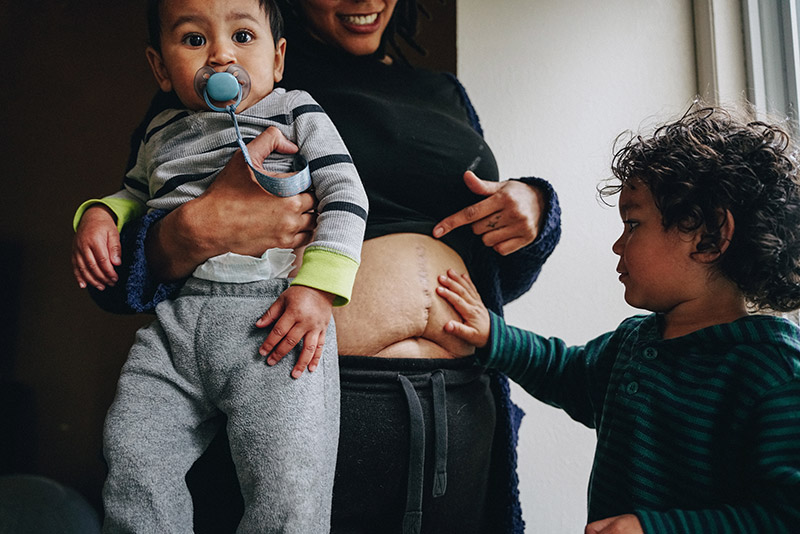
Halle Payne, 22, holds her 1-year-old Ezra while 2-year-old Amarius touches a scar on his mother’s abdomen on April 3, 2025, at their home in Morrison, Colo. The scar is a reminder of the surgery Payne went through during her first pregnancy to remove a dermoid cyst that was wrapped twice around one of her ovaries. Photo by Armando Geneyro / Special to The Colorado Trust
That experience prompted her to contact Mama Bird Doula Services, an Aurora-based provider focused on working with birthing people of color. Thanks to a scholarship from the group, she was able to access doula services for free for the rest of her pregnancy, delivery and postpartum period.
When Payne got pregnant with her second son a year later, the path to a doula-aided birth was easier. Most commercial insurers do not cover doulas as a standard benefit. But Colorado Access, a nonprofit health plan, worked with community organizations to help them provide Black birthers on Medicaid, like Payne, with doula services at no cost to them.
In July 2024, shortly after Payne’s baby was born, even more women were able to access the same supports as Health First Colorado, the state’s Medicaid program, added doulas as a fully covered benefit, joining around a dozen states in offering the service.
“I wanted support from people who could understand my background and my differences and some of the struggles I had gone through being a young mom of color,” she said.
Improving birth outcomes
Doulas are not medical professionals. They are trained caregivers who provide physical and emotional guidance and support during labor and the perinatal period—before and after birth.
Involving a doula in the birthing process has been shown to reduce the likelihood of C-sections and epidural use, shorten labor, improve birth outcomes and lower the risk of postpartum depression. Researchers believe these outcomes result from a combination of the continuous support doulas provide and the physical aid (via stretching and massage, for example) as well as encouragement throughout labor. Among low-income women, in particular, doulas can help improve breastfeeding outcomes—quickening the onset of milk secretion, or lactogenesis, and providing ongoing assistance that makes it possible for women to breastfeed for longer.
“Doulas act as advocates. They offer support… and they help serve as a cultural bridge between the patient and the health care system,” said Sheila Davis, director of the Center for Health Equity Initiatives at the University of Denver.
Colorado’s Medicaid doula program, approved through 2023 legislation, covers independent doulas, those working in health care facilities and group practices. Telehealth visits make prenatal and postpartum support more accessible in rural areas. Despite discussions at the federal level, there have been no announced changes to Colorado’s Medicaid program thus far. Doula coverage is also not included in the most commonly proposed areas for cuts, according to Marc Williams, a spokesperson for the Colorado Department of Health Care Policy & Financing (HCPF), the state agency that implements Health First Colorado.
Doula involvement in the birthing process has the potential to have considerable health impacts in Colorado: Women account for more than half of the state’s Medicaid membership, and the program covers 44% of all births statewide. About half of Health First clients are people of color—who are also more likely to undergo C-sections and receive less timely prenatal care.
Nearly 40% of Colorado’s counties are considered maternity care deserts, according to nonprofit March of Dimes, meaning there is no access to maternity care providers or birthing facilities.
In a review of data collected between 2016 and 2020, Colorado’s Maternal Mortality Review Committee found that Black and American Indian/Alaska Native populations “disproportionately experienced” higher pregnancy-related mortality. Nationally, the maternal mortality rate for Black women was 2.5 times higher than for white and Hispanic women in 2022, according to the Centers for Disease Control and Prevention.
Racism also plays a role in these statistics. Black women, for example, are more likely to deal with pregnancy complications such as preeclampsia, preterm birth and smaller babies at birth. The Colorado Perinatal Care Quality Collaborative reported that “discrimination contributed to 39.6% of all maternal deaths” in the state.
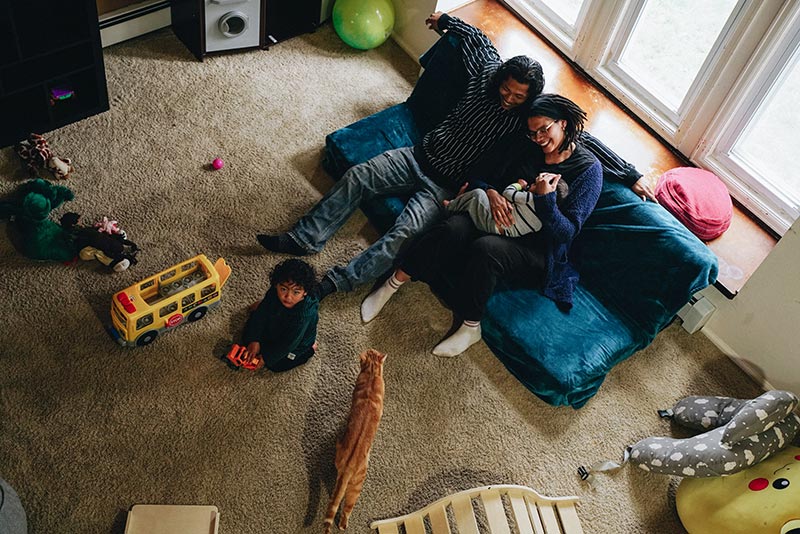
Halle Payne, her husband Frankie Dyer, and their son Ezra snuggle on the couch while 2-year-old Amarius plays with his toys on April 3, 2025, at their home in Morrison, Colo. Photo by Armando Geneyro / Special to the Colorado Trust
The notion of Medicaid covering doula services was “a conversation for a number of years as we think about how we improve maternal health equity in Colorado,” said Adela Flores-Brennan, HCPF’s Medicaid director and health policy office director. “We’ve been hearing from the community that people wanted additional options.”
As of early March, 50 doulas are enrolled in Colorado’s program and 204 Health First Colorado members have utilized their services so far—access to up to 180 minutes of prenatal and postnatal care, plus labor and delivery support—at no cost.
This program “could reduce the low birth rate problem. It could reduce maternal morbidity. It could help reduce maternal mortality,” Davis said.
More doula support could also help lessen the burden on other health care providers by reducing preterm births or the need for emergency C-sections, Flores-Brennan said. Currently, 1 in 10 Colorado babies are born premature, and 1 in 10 have a low birthweight, according to the March of Dimes. That’s about the same as the national average.
Joy Twesigye, vice president of health systems integration at Colorado Access, a nonprofit health insurance company that manages Health First Colorado for Adams, Arapahoe, Denver, Douglas and Elbert counties, often hears from clients that they want access to doula care, specifically to counteract some of the tragic outcomes that come with being a pregnant woman of color.
The 2023 doula legislation was a key strategy for “improving mental health and addressing racial disparities in maternal health, mortality and morbidity,” said Twesigye, who is Black and once worked as a doula. “When you know there’s racism, that there’s a systemic issue that you have no real control over during your pregnancy, that’s a huge stressor—and a huge burden.”
Receiving culturally sensitive care
Colorado’s new Medicaid benefit also helps doulas by creating a more viable career path with stability and consistent clientele. When the coverage began, for instance, Denver Health announced that it would hire its 23 volunteer doulas.
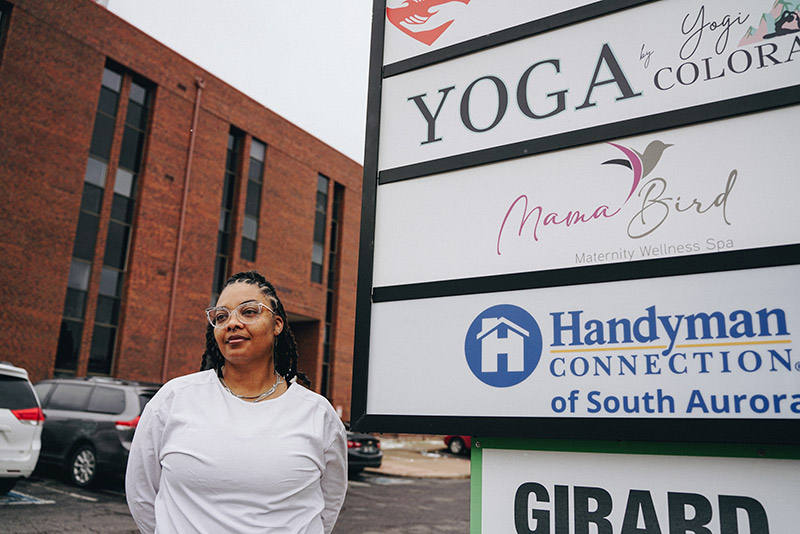
Doula Ta-Shara Toombs poses for a portrait on the morning of April 5, 2025, outside Mama Bird Maternity Wellness Spa in Aurora, Colo. Toombs works with Mama Bird, Saint Joseph Hospital and Denver Health. Photo by Armando Geneyro / Special to The Colorado Trust
“It does actually make a difference in my income and what my livelihood looks like,” said Ta-Shara Toombs, a Black doula based in Aurora who works with Mama Bird, Saint Joseph Hospital and Denver Health. Because Medicaid covers prenatal and postpartum care, too, Toombs can work more daytime hours and doesn’t need to take a second job.
Toombs was a teenage mother. She was 19 when her son was born at just 26 weeks in 2001. She hopes that working through the Medicaid system will allow her to help more teen mothers who can now access this kind of support.
“When you don’t know what’s going on, but you have somebody there that can help advocate for you, be that support system, that sounding board, that does something for people,” she said.
Toombs also endorses the idea that women of color having access to doulas of color is significant.
“It’s important to have doulas who can relate to you and who look like you,” she explained. “When you have a doula that looks like you or comes from the same background as you or economics as you, they have more understanding.”
Research supports her sentiment. Racial concordance, as it’s known, can improve health care outcomes and patient experience.
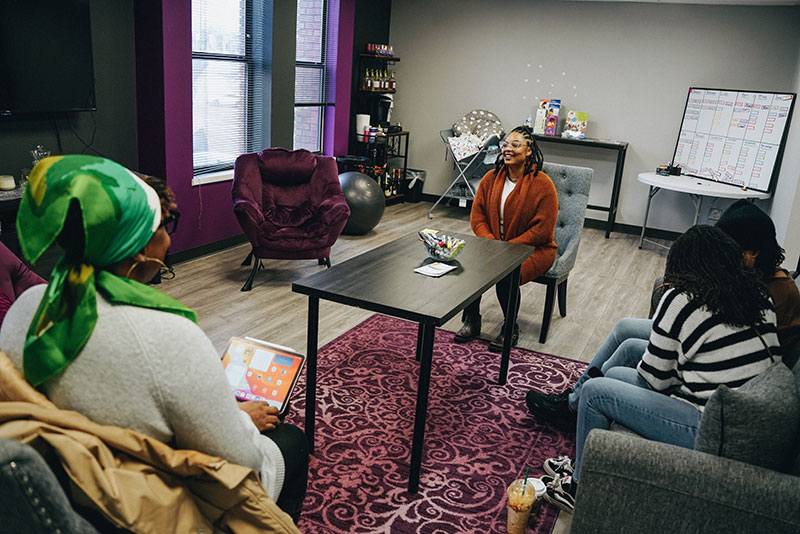
Ta-Shara Toombs, a doula, meets with expectant mothers on April 5, 2025, for an initial meet and greet at Mama Bird Maternity Wellness Spa in Aurora, Colo. During the meet and greet, Toombs breaks down what the mothers-to-be can expect from her if they decide to sign on with Mama Bird’s doula services. Photo by Armando Geneyro / Special to The Colorado Trust
Whether Health First Colorado’s effort can overcome the statistical headwinds borne by women of color remains to be seen. It will take time for enough data to come in. Still, Flores-Brennan said she’s “hopeful we can make a difference.”
HCPF isn’t waiting to find out. Last year, the department expanded its list of approved midwives by adding certified professional midwives to its providers. (Unlike doulas, midwives are trained health care professionals who can perform medical procedures.) In December, lactation support also became a covered benefit. It’s all part of a coordinated effort to improve supports for birthing members.
Building a village
Payne, who lives in Morrison, gave birth to her second son in April 2024. Throughout her pregnancy, she had access to doula assistance, as well as birth and postpartum preparation classes, support groups and a postpartum therapist, all covered by Medicaid.
“I felt super confident in different ways about myself, how I was going to be as a parent,” she said. “I am so grateful for that.”
Without Medicaid funding the coverage, Payne said she would have been hard-pressed to afford a doula—or find her calling. While pregnant, in 2023, she pursued her doula certification. Payne received a scholarship through Mama Bird and Westminster-based Allo Doula Academy to cover her training. (HCPF has partnerships with three doula agencies to provide scholarships for doula training and certification.)
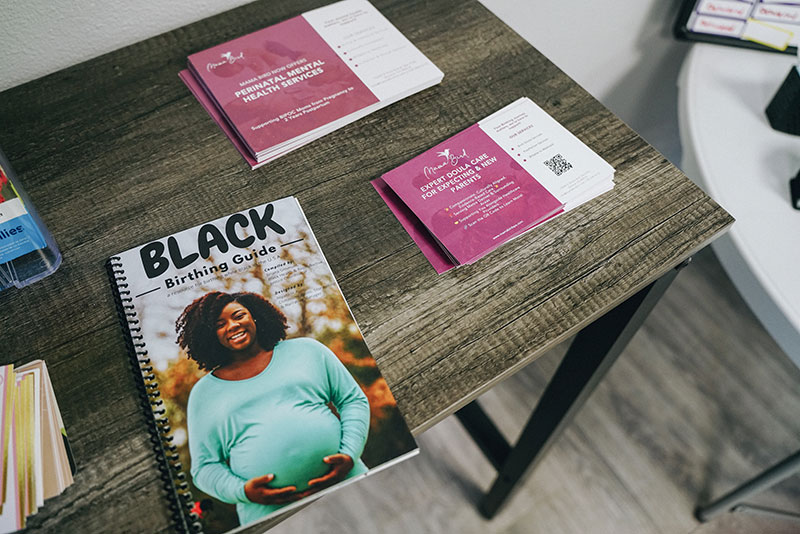
Inside Mama Bird Maternity Wellness Spa in Aurora, Colo., expectant mothers can find a wealth of useful books and pamphlets on birthing and perinatal mental health for Black mothers. The books shown above were on display at the center on April 5, 2025. Photo by Armando Geneyro / Special to The Colorado Trust
“[My experience] really motivated me to want to support other moms and families in general, but with a special focus on families of color,” Payne said. She also wants to help women from low-income backgrounds like her own.
Everyone deserves access to this kind of care, Payne said. Pregnancy and motherhood are “heavy, it’s intimate, it’s life-changing, and you need a village for that. They’ve inspired me to be that village for other people.”
Editor’s note (Oct. 16, 2025): This story was updated to clarify the timing of Medicaid coverage for doula services, including a Colorado Access grant that covered doula services before Medicaid coverage was implemented statewide. While Halle Payne was a Medicaid client at the time of giving birth, her doula services were covered by the grant funding. Colorado Access helps manage Medicaid clients for Health First Colorado in Adams, Arapahoe, Denver and Douglas counties.